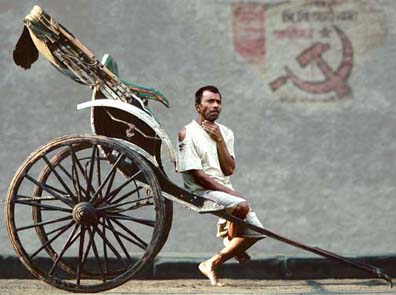 In August 2005, the Chief Minister of West Bengal announced that rickshaws would be removed from Calcutta. My response:
In August 2005, the Chief Minister of West Bengal announced that rickshaws would be removed from Calcutta. My response:The Left Front Govt of West Bengal wants to get rid of the image - of man's inhumanity to man - rather than the reality of an inhumane society with inhuman living conditions for the labouring poor. There is actually no humanity in the govt, for that would have meant working out a proper rehabilitation programme for the rickshaw pullers. Inhumanity, and vanity.
Creating an image, or dispelling an image versus actually erasing inhumanity. Banning rickshaws without successfully arranging alternatives for the pullers means actually inflicting cruelty on the pullers, in the name of creating an image of humanity.
Hand and cycle rickshaws are appearing in cities in Europe today. One can visualise a regulated trade in Calcutta, where the puller derives a fair and humane wage. There are also other forms of inhumanity - domestic servitude, working conditions in the unorganised sector, living conditions of the urban poor in slums and shanties. On none of these is the govt doing anything.
The govt is also displaying its parochialism - the pullers are predominantly Bihari. They are insecure, unorganised. Hence they are an easy target. Such biases can also be seen in Howrah station, in the conflict between the red-shirt (licensed, Bihari) porters and the (unlicensed, Bengali) blue-shirt porters.
Rickshaw pulling does not really disrupt traffic. It is a meaningful mode of transport in particular localities, for particular functions, for both passengers and freight. The ergonomics of the hand rickshaw are superior to that of the cycle rickshaw (the model used in Calcutta). Cycle rickshaws are more of a nuisance, their conditions are pathetic, the plight of the cycle rickshaw puller is worse than that of the hand-puller, they represent a greater inhumanity, far greater numbers of cycle rickshaws exist. The health profile of the typical cycle-puller is far worse than that of the hand-puller. Though they are also periodically harassed in various localities, yet they are more organised than the hand-pullers.
Legality and illegality - what are all the illegal activities flourishing in the city organised by political cadres? Flagrant violation of law is found in every sphere of life. Like the bus-owners now, threatening public disruption if efforts are made to implement pollution control norms! The auto-rickshaw is entirely unwholesome and undesirable. Is a prime instrument of air and noise pollution. They are a menace to traffic. Unsafe, severely harmful. Part of a noxious lumpen under-life of the city. Most autos are illegal. Permits are given to party cadres. Beneficiaries have let out the vehicle to a driver, and often the actual driver is twice-removed from the owner, for whom the auto has become a means to derive an income from others' labour. No civilised city should have auto-rickshaws.
The pretext of freeing roads for cars - raises the question of how long the unchecked growth of private cars will continue. There has to be a long-term plan, both of expanding roads, but also limiting and controlling private cars - as London has successfully demonstrated. Traffic flow is severely impeded by hawking, markets and shops on pavements and roadsides, which are organised and profited from by political cadres. Public transport is in a shambles. When will the people of Calcutta rise up against their ugly rulers?
I have been surprised by the public response (or lack of) to the recently announced decision of the West Bengal state govt to ban hand-pulled rickshaws in Calcutta. One is not hearing the demand that the whole issue of alternative livelihood must be satisfactorily resolved before putting an end to the honest livelihoods of tens of thousands of pullers, with minimum disruption to the pullers. The media had reported in the past that the Chief Minister's wife had protested against cutting down of trees in the city. Similarly, there were reports that the CM's daughter had complained against the removal of stray dogs from near their residence. But whose heart bleeds for the rickshaw puller?
After their having served the people of Calcutta, so devotedly, loyally and intimately, for so many years? Who will stand beside them now? During the rains, during floods; carrying invalids and the elderly; carrying little children to and from school; carrying shopping-laden families; rickshaw pullers have been an intimate part of the daily lives of Calcuttans. The leftist govt seems to have forgotten the moving portrayal of the Bihari rickshaw puller by the much-loved actor Balraj Sahni in Bimal Roy's film Do Bigha Zamin? Is it because they are Bihari that they are treated so callously, despite their service to the city?


No comments:
Post a Comment